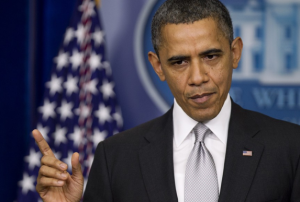ENVIRONMENT
New York Times Pushes Obama On Climate: ‘He Needs To Do A Great Deal More Than…Foster A Conversation’
December 29, 2012 · 0 Comments

By Stephen Lacey:
Many were disappointed after President Obama’s first post-election press conference when he talked about the urgency of climate change — and then immediately swept aside specifics for action in his second term.
Days after, White House press secretary Jay Carneyshot down the prospects for a carbon tax by saying the Administration would “never propose” such a policy.
There doesn’t seem to be much urgency coming out of the White House.
In response, The New York Times is calling out the President for his plan to address climate change with a “conversation”:
Since his re-election, Mr. Obama has agreed to foster a “conversation” on climate change and an “education process” about long-term steps to address it.He needs to do a good deal more than that. Intellectually, Mr. Obama grasps the problem as well as anyone. The question is whether he will bring the powers of the presidency to bear on the problem.
Enlisting market forces in the fight against global warming by putting a price on carbon — through cap-and-trade or a direct tax — seems out of the question for this Congress. But there are weapons at Mr. Obama’s disposal that do not require Congressional approval and could go a long way to reducing emissions and reasserting America’s global leadership.
One imperative is to make sure that natural gas — which this nation has in abundance and which emits only half the carbon as coal — can be extracted without risk to drinking water or the atmosphere. This may require national legislation to replace the often porous state regulations. Another imperative is to invest not only in familiar alternative energy sources like wind and solar power, but also in basic research, next-generation nuclear plants and experimental technologies that could smooth the path to a low-carbon economy.
Mr. Obama’s most promising near-term strategy may be to invoke the Environmental Protection Agency’s authority under the Clean Air Act to limit emissions from stationary sources, chiefly power plants.
Indeed, the Administration deserves credit for passing numerous critical executive policies promoting vehicle efficiency, mercury standards, building efficiency standards, and renewable energy. And with Congress unable to act on climate policy, the importance of EPA regulations for global warming pollution is even greater in Obama’s second term. However, EPA Administrator Lisa Jackson in on her way out, opening up some uncertainty about leadership at the agency: The New York Times explains:
Any such regulations are likely to be strongly opposed by industry and will require real persistence on the administration’s part. If Mr. Obama takes this approach, he will certainly need a determined leader at E.P.A. to devise and carry out the rules. Lisa Jackson, the E.P.A. administrator who on Thursday announced her resignation after four productive years in one of the federal government’s most thankless jobs, was just such a leader.
She suffered setbacks — most notably the White House’s regrettable decision to overrule her science-based proposal to update national health standards for ozone, or smog. But she accomplished much, including tougher standards for power plant emissions of mercury and other air toxics, new health standards for soot, and, most important, her agency’s finding that carbon dioxide and five other gases that contribute to global warming constituted a danger to public health and could thus be regulated under the Clean Air Act.
The New York Times piece fails to point out one of the most critical — and often ignored — pieces of climate policy. Creating new standards for power plants and building renewable energy is only one piece of the equation. In order to truly address carbon pollution, we must keep large amounts of coal, oil, and gas in the ground. According to the International Energy Agency, nearly two-thirds of known fossil fuel reserves must stay underground in order to avoid catastrophic climate change. While the Obama Administration has done more than any other administration in history to promote alternative forms of energy, it has also shown a willingness to aggressively promote unchecked fossil fuel extraction.
In a recent Time Magazine interview, President Obama said that climate would be one of his top three priorities in his second term. So far, there aren’t many strong signals that the Administration has a coherent plan to actually back up those claims.
By admin










Sorry, comments are closed on this post.